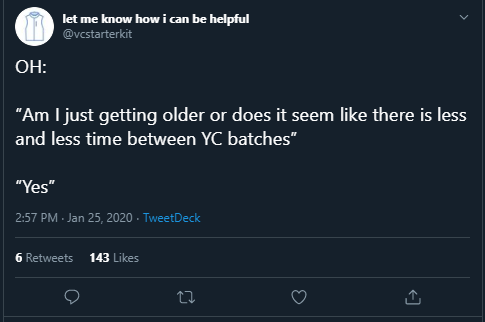Frankly Speaking, 1/28/20 - Using my PhD in the VC world
A biweekly(-ish) newsletter on random thoughts in tech and research. I am an investor at Dell Technologies Capital and a recovering academic. I am interested in security, blockchain, and cloud.
If you were forwarded this newsletter, you can subscribe here, and view old newsletters here.
The year is off to a pretty fast start. Honestly, it feels like August already. Lots of stuff going on in the VC world, especially in security. RSA is coming up, so there's been a lot of activity around that. So much for wanting a slower year...
LET'S BE FRANK
People always ask me, "Frank, do you think having a PhD helps with VC?" Honestly, I'm not sure what helps with VC other than having a strong network. If you look at the best VCs, the only strong pattern is that they used their previous roles or had a unique skill that allowed them to build an extensive network. With that said, PhDs that do VC are a rare breed. I can only think of a handful.
Anyway, this week, I wanted to highlight some PhD skills I've found to be useful.
Developing strong theses.
In VC, investors commonly develop theses about what companies or spaces will generate value. Especially, when looking at a specific company, it's important to ask questions about both the company and space. No company is perfect, of course, and it's important to identify potential risks and how they could be mitigated. During my PhD, this was a very key component, i.e. writing papers with strong theses. There was a lot of "defensive text" to anticipate reviewers' concerns. I also had to evaluate papers, which is similar to evaluating a company. Having these critical thinking skills help us truly understand the a company's strengths and weaknesses.
Deep thinking and predicting the future.
Thinking deeply and creatively about technical topics is really a skill. I spent 6 years doing it during my PhD. Creative and deep thinking takes not only a long time in general, but also a long time to learn. I was fortunate to have time to do deep thinking, but as a VC, I have much less time. I have had to become creative in finding time to do deep thinking. But why is deep thinking important? It's hard to really analyze something and understand all the angles, especially different problems, which require creativity without just putting in the time. Putting in the time doesn't guarantee any outcome, but it's necessary because we are solving problems others haven't solved. Any difficult problem required deep thinking and creativity. In VC, we are essentially paid to predict the future and find the companies that will generate the most value in a space. In research, we are asked to create relevant future knowledge. Much of research isn't used or adopted, but should still do it if we believe there is any future value and then convince peer reviewers to publish it.
Knowing what you know and don't know.
As a PhD student, you become very good at figuring what you know and you don't know. It's impossible to be an expert at everything. So, you have to use your strengths to complement your weaknesses. More practically, you need to figure out what's easy for you to learn and where you should ask for help. Of course, you have to have something to offer in return for help. In VC, this is very similar. You have to realize your strengths an investor and develop a network to cover your weaknesses.
TWEET OF THE WEEK
Time is a complicated thing.....




